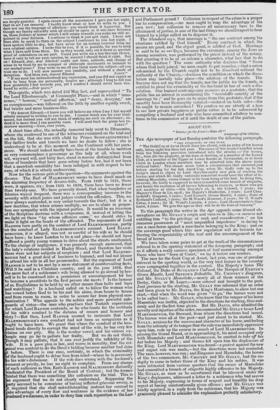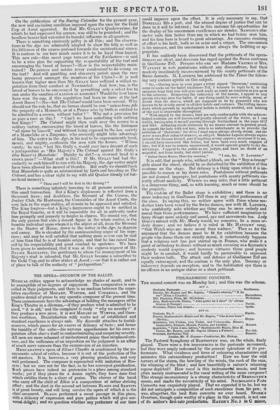ASCOT CUP.
" Down,•--ild the front I—Hats off I"
Language of the Pittites. Language of the Pittites.
" The Gold Cup at Ascot Heath Race has closed, with an entry of ten horses only, being eight less than last year. The cause of this limited number arises from the following provision introduced into the articles For horses,
&c. bona fide the property, at the time of starting, of a member of the Jockey OA, of a member of the Upper or Lower Rooms at Newmarket, or of those
Clubs in London whose members may be admitted into the above clubs without ballot.' This clause arose from a circumstance that occurred just before starting for the last Ascot Cup, when Mr. Gully rode up to the Judge's stand to object to Lord Maryborough's new plan of starting the horses, and which Mr. Gully naturally conceived would have the effect of ir- ritating Mameluke, whose temper is far from being of the best. In doing this, however, Mr. Gully is supposed to have committed some breach of etiquette, and hence the exclusion of all horses belonging to trainers, or those who are not members of clubs.—His Majesty's eh. h. the Colonel, 5 years ; his Majesty's Fleur de Lis, aged ; his Majesty's Hindostan, 5 years ; Lord Ches- terfield's Zinganee, 5 years ; Lord Exeter's Green Mantle, 4 years ; Duke of Rutland's Cadland, 5 years; Sir M.Wood's Mummer, 3 years ; Sir M. Wood's Cetus, 3 years; Sir M. Wood's Lucetta, 4 years ; Lord Muuntcharles's Gay- hurst, 4 years. We give the ages as they will be at the time of running."
To this paragraph the writer in the Age appends some kbsurd ob- servations on Mr. GULLY'S origin and success in life,—a success not entitling him "to the privilege of rank and consideration ;" on his immense possession of "most unqualified impudence" in daring to run a race-horse against a race-horse belonging to the King; and on the sovereign good which this new regulation will do towards fur- thering the respectability of the turf and the encouragement of the breed of horses.
We have taken some pains to. get at the truth of the circumstances referred to in the opening statement of the foregoing paragraph; and as it affords a really curious specimen of turf manceuvermg amongst those who have "been at Court," we lay it before our readers.
The race for the Gold Cup at Ascot, last year, was one of peculiar -interest to the sporting world, as the very best horses in the country were congregated together in the contest. His Majesty's horse The Colonel, the Duke of RUTLAND'S cad/and, the Marquis of EXETER'S Green Mantle, Lord SErroN's Bobadilla, Mr. CHIFNEY'S Zinganee, and Mr. GULLY'S Mameluke,--nearly all of them winners of the Derby, Oaks, or St. Leger,—were entered and brought to the post. Just previous to the starting, Mr. GULLY was informed that an order had been given to Mr. DAVIS, the King's Huntsman, to allow but one start,—that when the word was given "to go," the horses were not to be called back. Mr. GULLY, who knew that the temper of his horse Mameluke was fretful, objected to the directions for starting, thus sud- denly and for thefirst time given. But Mr. DAVIS, who admitted the novelty and injustice of the order, recommended Mr. GULLY to see Lord MARYBOROUGH, the Steward, from whom the directions had issued. The horses were all at the post—and just about to be started. Mr. GULLY, anxious for the success and character of his horse, and feeling from the infirmity of its temper that the rule was immediately oppressive upon him, rode up the course in search of Lord MARYBOROUGH. In passing the Grand Stand, or in approaching it, his mind occupied only with Mameluke and Lord MARYBOROUGH, he omitted to take off his hat before his Majesty ; and thence fell upon him the displeasure of the King. Lord MARYBOROUGH was found—a protest against the new and unjust rule was made,—but the directions were not rescinded.
The race, however, was rim ; and Zinganee and Mameluke, the horses of the two commoners, Mr. CHIFNEY and Mr. GULLY, had the au- dapity to come in before those of the King and his nobles. It was soon intimated from various quarters that the owner of Mameluke had committed a breach of etiquette highly offensive to his Majesty. Mr. GULLY, as soon as he ascertained that he laboured under the King's displeasure, addressed a letter to a nobleman who had access to his Majesty, expressing in terms of respect and humility his deep regret at having unintentionally given offence ; and Mr. GULLY was i kindly apprized, n a reply from the nobleman, that his Majesty was graciously pleased to consider the explanation perfectly satisfactory. • .0n the publication of the Racing Calendar for the present year, ,the new and excluding condition imposed upon the race for the Gold Cup at Ascot appeared. So that Mr. GULLY'S Quaker-crime, for which he had expressed his sorrow, was still to be punished ; and the heedless beaver had extended its baneful influence in all quarters. There is something eminently paltry in all this ; and the observa- tions in the Age are admirably adapted to show the folly as well as the littleness of the course pursued towards the unintentional sinner. It is curious to see how much easier it is to be loyal than logical. This new rule—this novel page torn out of the Exclusives—is said to be a wise plan for supporting the respectability of the turf and • encouraging the breed of horses !—How is the respectability main- tained? Do princes and nobles never condescend to do wrong on the turf? And will gambling and chicanery perish upon the race being preserved amongst the members of the Clubs ?—It is well known that higher men than Mr, GULLY have suffered a sullied re- putation from their conduct at Newmarket. And how, too, is the breed of horses to be encouraged by permitting only a select few ta run under the sanction of a crown or a coronet? "Would the best horse have won the cup, if this regulation had been in force at the last Ascot Races ?—No—but The Colonel would have been second. Why should not the rule be, that no horses should be run "unless bone fide the property of a Monarch, or of a Prince who by birth is entitled to be admitted to a crown, without ballot ? " -Why not a provision for so pure a race as this ? "Can't we have something with nothing but Kings ? " The Colonel might then walk over the course to a • solitary victory, encouraging the breed of horses, like the Irishman "all alone by himself," and without being exposed to the law society . of a Mameluke or a Zinganee, who assuredly might take advantage of him. The writer in the Age, in his zeal to be supereminently loyal, moral, and mighty, confoituds the men with the horses. "Whose vanity," he says, "but Mr. Gully's, would ever have dreamt of such a juxtaposition as His Majesty's The Colonel against Mr. Gully's (the Boxer's) Mameluke: Dignity to dirtl—a crowned head to a crown piece ! "—What stuff is this ! If Mr. GULLY had had the audacity to seek himself to run with his Majesty, the Age writer might have been allowed his morsel of thunder. But really we should think that Mameluke is quite as Aristocratical by birth and breeding as The Colonel, and has a clear right to say with old Quaker Steady (of hat- on-head memory),
"Thou and T will be first in the throng ! "
There is something infinitely lowering to all persons concerned in this small transaction. But a King's displeasure is reflected from a thousand faces ; and doubtless, the Steward of the Course, the Jockey Club, the Huntsman, the Constables of the Ascot Cords, the very lads in the regal stables, all remain to be appeased and satisfied. The King forgives—but a King's forgiveness ought to be notified in the Royal Gazette, or it will be impossible for all in authority under him promptly and properly to forgive in chorus. We should say, that the only person that cuts a decent figure in the whole matter, is the humble individual upon whom it is the object of all, from the Steward or the Master of Horse, down to the writer in the Age, to degrade and annoy. He is elevated by the condescending anger of his supe- riors; and may be well satisfied that nothing more severe can be said of him than that he is of humble origin, and that he has raised him- self by his respectability and good conduct to opulence. We have been given to understand, that it was at the express request of Mr. DELME RADCLIFFE, the gentleman to whom the management of his Majesty's stud is intrusted, that Mr. Gurzir became a subscriber to the Gold Cup, and to other stakes at Ascot ;—so that it is rather out of place to talk of the audacity of "juxtaposition."



















 Previous page
Previous page